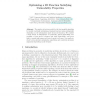Free Online Productivity Tools
i2Speak
i2Symbol
i2OCR
iTex2Img
iWeb2Print
iWeb2Shot
i2Type
iPdf2Split
iPdf2Merge
i2Bopomofo
i2Arabic
i2Style
i2Image
i2PDF
iLatex2Rtf
Sci2ools
ESA
2005
Springer
2005
Springer
Optimizing a 2D Function Satisfying Unimodality Properties
The number of probes needed by the best possible algorithm for locally or globally optimizing a bivariate function varies substantially depending on the assumptions made about the function. We consider a wide variety of assumptions—in particular, global unimodality, unimodality of rows and/or columns, and total unimodality—and prove tight or nearly tight upper and lower bounds in all cases. Our results include both nontrivial optimization algorithms and nontrivial adversary arguments depending on the scenario.
Bivariate Function Varies | ESA 2005 | Nontrivial Adversary Arguments | Nontrivial Optimization Algorithms |
Related Content
| Added | 27 Jun 2010 |
| Updated | 27 Jun 2010 |
| Type | Conference |
| Year | 2005 |
| Where | ESA |
| Authors | Erik D. Demaine, Stefan Langerman |
Comments (0)

